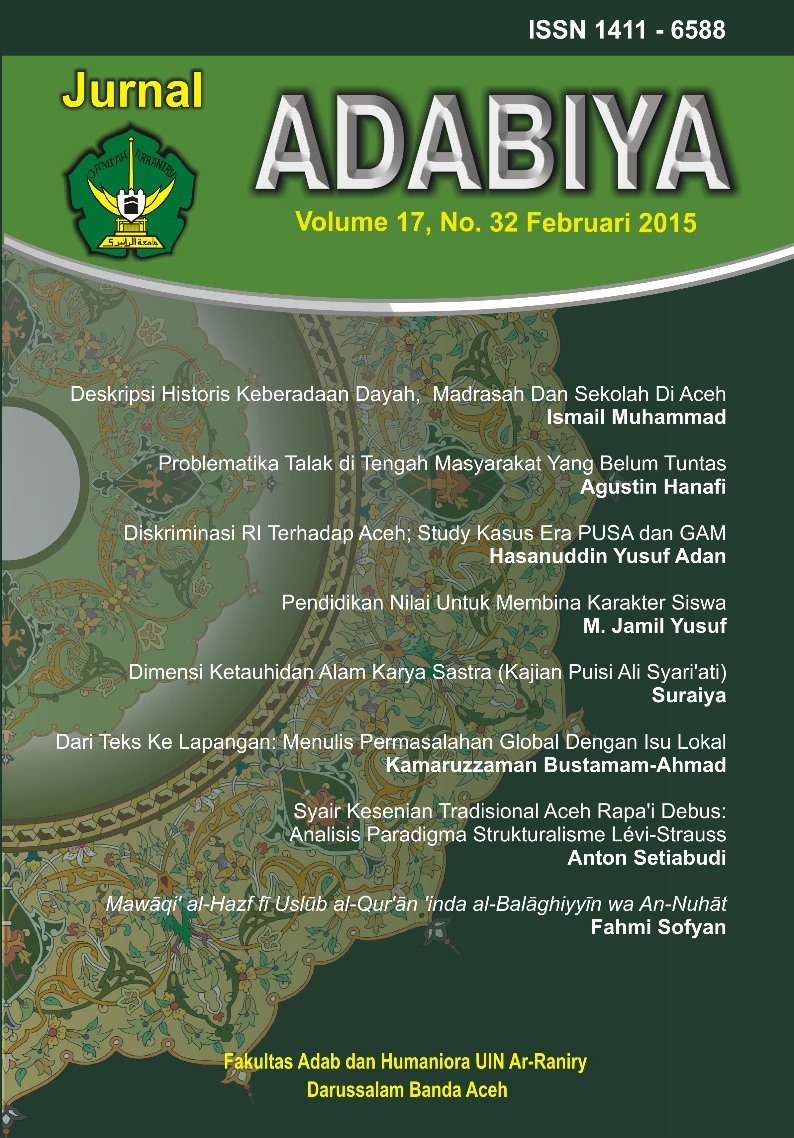References
Ali Imron Al-Makruf. Pengkajian Sastra; Teori Dan Aplikasi. I. Surakarta: Djiwa Amarta Press, 2017.
Andik Wahyun Muqoyyidin. “Wacana Kesetaraan Gender : Pemikiran Islam Kontemporer Tentang Gerakan Feminisme Islam.” Jurnal Al-Ulum IAIN Gorontalo 13, no. 2 (2013)
Arifianie, Ani Dessy. “Analisis Konflik Psikis Tokoh Utama Dan Nilai-Nilai Pendidikan Karakter Dalam Novel Asmarani Karya Suparto Brata.” Tesis Pascasarjana. Universitas Sebelas Maret, 2014.
Batu, Purnama N F Lumban. “Eksistensi Tokoh Perempuan Dalam the Other Side of Midnight Program Pascasarjana.” Universitas Dipenogoro, 2007.
Dewi Istiqomatul Karomah. “Citra Perempuan Pada Autobiografi Perempuan-Perempuan Harem Karya Fatima Mernissi.” Jurnal Pendidikan Dan Pengajaran Untan 3, no. 11 (2014)
Dhayyif, Syauqi. Al-Adab Al-‘Araby Al-Mu`ashir Fi Misr. Cairo: Dar al-Ma’rif, 1961.
Ena Putri Marsanti. “Aspek Kejiwaan Tokoh Dalam Novel Sebelas Patriot Karya Andrea Hirata.” Jurnal Basastra FKIP USM 1, no. 1 (2012)
Fajarwati, Ana Bilqis. “Islam Dan Demokrasi Dalam Perspektif Fatima Mernissi.” Jurnal Religio FUF UIN Sunan Ampel UIN Sunan Ampel 1, no. 1 (2011)
Geleuk, Maria Benga. “Perjuangan Tokoh Perempuan Dalam Novel Tanah Tabu Karya Anindita S. Thayf: Kajian Feminisme Eksistensialis.” Jurnal Ilmu Budaya Universitas Mulawarman 1, no. 3 (2017)
Herdayanti, Yati. “Alur Dan Watak Tokoh Utama Dalam Kumpulan Cerpen Netizen Karya Rahman Dkk.” Jurnal Pendidikan Dan Pengajaran Untan 3, no. 5 (2016)
Khoirul Faizain. “Mengintip Feminisme Dan Gerakan Perempuan.” Jurnal Egalita UIN Malang 2, no. 1 (2007)
Latifi, Yulia Nasrul. “Rekonstruksi Pemikiran Gender Dan Islam Dalam Sastra; Analisis Kritik Sastra Feminis Terhadap Novel Zaynah Karya Nawal As-Sa’dawi.” Jurnal Musawa IAIN Palu 15, no. 1 (2016)
Mernissi, Fatima. Ahlâm Al-Nisâ Al-Harem. Damaskus: Wardah Publisher, 1997.
———. Pemberontakan Wanita. Penerj. Rahmani Astuti. Bandung: Mizan, 1999.
Mukaromah, Kholila. “Hermeneutika Hadis Fatima Mernissi; Aplikasi Terhadap Hadis Kepemimpinan Perempuan.” Jurnal Universum STAIN Kediri 12, no. 1 (n.d.)
Nugrahani, Farida. Metode Penelitian Kualitatif. Surakarta, 2014.
Nurgiyantoro, Burhan. Teori Pengkajian Fiksi. Yogyakarta: UGM University Press, 1998.
———. “Transformasi Cerita Wayang Dalam Novel Amba Dan Pulang.” Jurnal Litera UNY Yogyakarta 15, no. 2 (16AD)
Wijayanti, Ratna. “Pemikiran Gender Fatima Mernissi Terhadap Peran Perempuan.” Jurnal Muwazah IAIN Pekalongan 10, no. 1 (2018)



